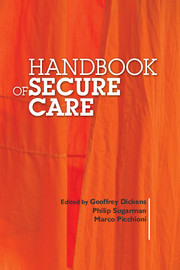Book contents
- Frontmatter
- Contents
- List of tables, boxes and figures
- List of contributors
- Preface
- 1 The evolution of secure and forensic mental healthcare
- 2 Mental disorder and offending
- 3 Clinical risk assessment in secure care
- 4 Risk management in secure care
- 5 Recovery in secure environments
- 6 Personality disorder
- 7 Women's mental health, aggression and offending
- 8 Offenders with intellectual disability in secure services and the criminal justice system
- 9 Secure mental healthcare for young people
- 10 Secure care for people with autism spectrum disorder
- 11 Acquired brain injury, trauma and aggression
- 12 Managing aggression and violence in older people
- 13 Firesetting in secure settings: theory, treatment and management
- 14 Specialist psychological treatment programmes in secure mental healthcare
- 15 Nursing in secure mental healthcare settings
- 16 Prescribing for specialist populations
- 17 Human rights in secure psychiatric care
- 18 Quality assurance and clinical audit in secure psychiatric care
- 19 Psychological support following violent assault and trauma: what works for staff in secure settings?
- Index
14 - Specialist psychological treatment programmes in secure mental healthcare
Published online by Cambridge University Press: 02 January 2018
- Frontmatter
- Contents
- List of tables, boxes and figures
- List of contributors
- Preface
- 1 The evolution of secure and forensic mental healthcare
- 2 Mental disorder and offending
- 3 Clinical risk assessment in secure care
- 4 Risk management in secure care
- 5 Recovery in secure environments
- 6 Personality disorder
- 7 Women's mental health, aggression and offending
- 8 Offenders with intellectual disability in secure services and the criminal justice system
- 9 Secure mental healthcare for young people
- 10 Secure care for people with autism spectrum disorder
- 11 Acquired brain injury, trauma and aggression
- 12 Managing aggression and violence in older people
- 13 Firesetting in secure settings: theory, treatment and management
- 14 Specialist psychological treatment programmes in secure mental healthcare
- 15 Nursing in secure mental healthcare settings
- 16 Prescribing for specialist populations
- 17 Human rights in secure psychiatric care
- 18 Quality assurance and clinical audit in secure psychiatric care
- 19 Psychological support following violent assault and trauma: what works for staff in secure settings?
- Index
Summary
Introduction
Psychological treatments in secure mental health settings comprise a wide range of interventions that are delivered at the individual, group and ward milieu level. Different forms of structured psychological treatments have evolved in these settings to offer remediation of mental health problems and symptoms and to reduce risk. The past 20 years have witnessed a significant expansion of psychological therapies facilitated by governmentdriven initiatives to improve access to talking therapies. Over the same time period there has been an expansion in the provision of psychological, educational and behavioural intervention programmes for offenders, including those detained in secure psychiatric settings, based on the ‘what works’ in reducing reoffending literature (Lipsey & Wilson, 1993; Lösel, 1996; Hollin, 1999). In the UK, much progress in secure services has been driven by the National Health Service's (NHS's) Improving Access to Psychological Therapies (IAPT) programme (www.iapt.nhs.uk). The National Institute for Health and Care Excellence (NICE) guidelines for specific disorders have highlighted the evidence base for psychological therapies and the development of minimum standards for patients in secure services has been paralleled by an increased focus on high-quality in-patient care (Doyle et al, 2012). This has had an impact on the model of service delivery for psychological treatments. Accordingly, psychologists have been less involved in directly providing interventions and more involved in treatment development, training and consultative capacities, for example in the development of manualised treatments that aim to improve treatment integrity and facilitate treatment delivery by (trained) non-psychology staff (Hollin, 2006). Psychological therapies are therefore currently provided by clinical and forensic psychologists, and also by psychiatrists, specially trained mental health nurses, occupational therapists, psychotherapists and art and drama therapists.
This chapter is intended as a general guide to evidence-based psychological interventions for patients in secure psychiatric settings. It draws on evidence from a growing international literature on the effectiveness of interventions in criminal justice settings, with specific examples of programmes that operate in the UK, such as Controlling Anger and Learning how to Manage it (CALM; Ministry of Justice, 2010a). These programmes, whose primary goal is reduction of recidivism, are not routinely transferable into forensic mental health settings, where the emphasis is on reducing the risk posed by factors such as mental illness and substance misuse in addition to index offence-based work (Long et al, 2008).
- Type
- Chapter
- Information
- Handbook of Secure Care , pp. 211 - 230Publisher: Royal College of PsychiatristsPrint publication year: 2015



